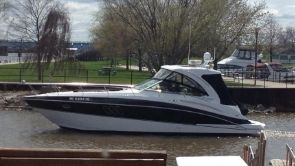I found this article interesting,
Quote:
How To Find Leaking Current
A couple of boaters in our marina reported a high degree of corrosion to their outdrives. So, we decided to have an electrician measure the amount of current in our marina. But no one seems to know what an acceptable level is. Are there any standards set for this? Our findings:
6/10/10-19.8 mv and 52.mv (different locations)
8/12/10-33.8mv and 82.5mv
9/17/10-25.2mv and 44.8mv
We plan one more reading after all boats are out of the water. Can you shed light on this test and whether we’re within normal, safe range?
Jim Minnich
Marblehead, OH
Don Casey: Voltage between the 120V AC grounding socket and the water should be zero. Any reading other than zero indicates a leak. If your electrician will switch the scale to amps, he or she can measure the magnitude of the current leak. If the leak is DC, any reading above 10mA is damaging the underwater components of your tenant boats. However, the fault may well be a boat in the marina rather than the marina wiring. Identify the source by plugging in (or unplugging) one boat at a time. Theoretically alternating current should not contribute to corrosion, but AC leakage into the water can be lethal for swimmers, particularly in fresh water. Stay with this until you’ve identified the leak source and stemmed it.
Heres another
Quote:
Rampant Galvanic Action
I have a 2850 Bayliner, purchased new in 2001. We’ve had outdrive service performed annually, and at each haul-out the lower unit appeared as new. However, upon haul-out for outdrive service this year, the lower unit was corroded, with several deep pits and loss of metal, and the zincs were fouled with corrosion. The boat has always been moored in the same slip, under cover in Lake Washington fresh water. We’ve always used shore power to keep batteries charged, and to power a small heater/dehumidifier. When I checked the boat last winter, the heater/dehumidifier was off; I found the plug-in connection for shore power was dead at the dock. The marina replaced the plug, and the heater/dehumidifier worked fine thereafter.
When I saw the corrosion or electrolysis this spring at haulout, I became very concerned about the damage: much loss of metal on the thinner parts of the outdrive, lots of pits, and severe corrosion on the zincs. As part of the outdrive service, the zincs were replaced. Several weeks later I had another haul-out for bottom painting, and found the new zincs to again be severely corroded. It seems that whatever was causing the damage to the outdrive lower unit was also affecting the zincs. I tested the shorepower plug on the dock; it had no grounding. Other plugs on the dock had grounding, and none of their lower units appeared unusual. Did the lack of shore-power grounding lead to grounding into the lake via the outdrive, resulting in electrolysis?
Jeff Stevenson
Kirkland, WA
Don Casey: That seems to be exactly what’s happening. Some appliance on your boat — probably the battery charger — connects both to the shore-power AC and to the battery, which grounds to your engine. Any current “leakage” in a three-wire AC appliance should find its way to ground via the grounding wire. Without the grounding wire, that leakage flows through the DC ground to your engine and into the water via the outdrive, taking metal with it.
As bad as accelerated corrosion is, there’s worse. If the normally grounded metal case of your battery charger or any AC appliance aboard is or becomes energized, it represents an immediate and real risk of electrocution. In addition, the AC flowing into the water around your boat due to missing or disconnected grounding can kill a swimmer, and the problem is made more dangerous in fresh water. Unplug your boat immediately and talk to your marina management, with the term “liability” in your conversation. While they get the outlet wired correctly, buy yourself an outlet tester (around $10 locally or from Amazon) and check this outlet and every outlet you use for both proper ground and proper polarity every time before you plug in. (You’ll need an adaptor to plug a tester into a standard shore power outlet. If you continue to leave your boat plugged in, you should consider installing a galvanic isolator.)
this can be found here
http://www.boatus.com/magazine/2011/february/ask.asp_________________
Jeff
'14 Cruisers 380 Express "Simon Sez"
Merc 8.2 Mag MPI 380
DTS B3X, (x2) Axius Premier
(SOLD)
'08 V318
Merc 350 Mag MPI 300
DTS Seacore, B3 (x2)




